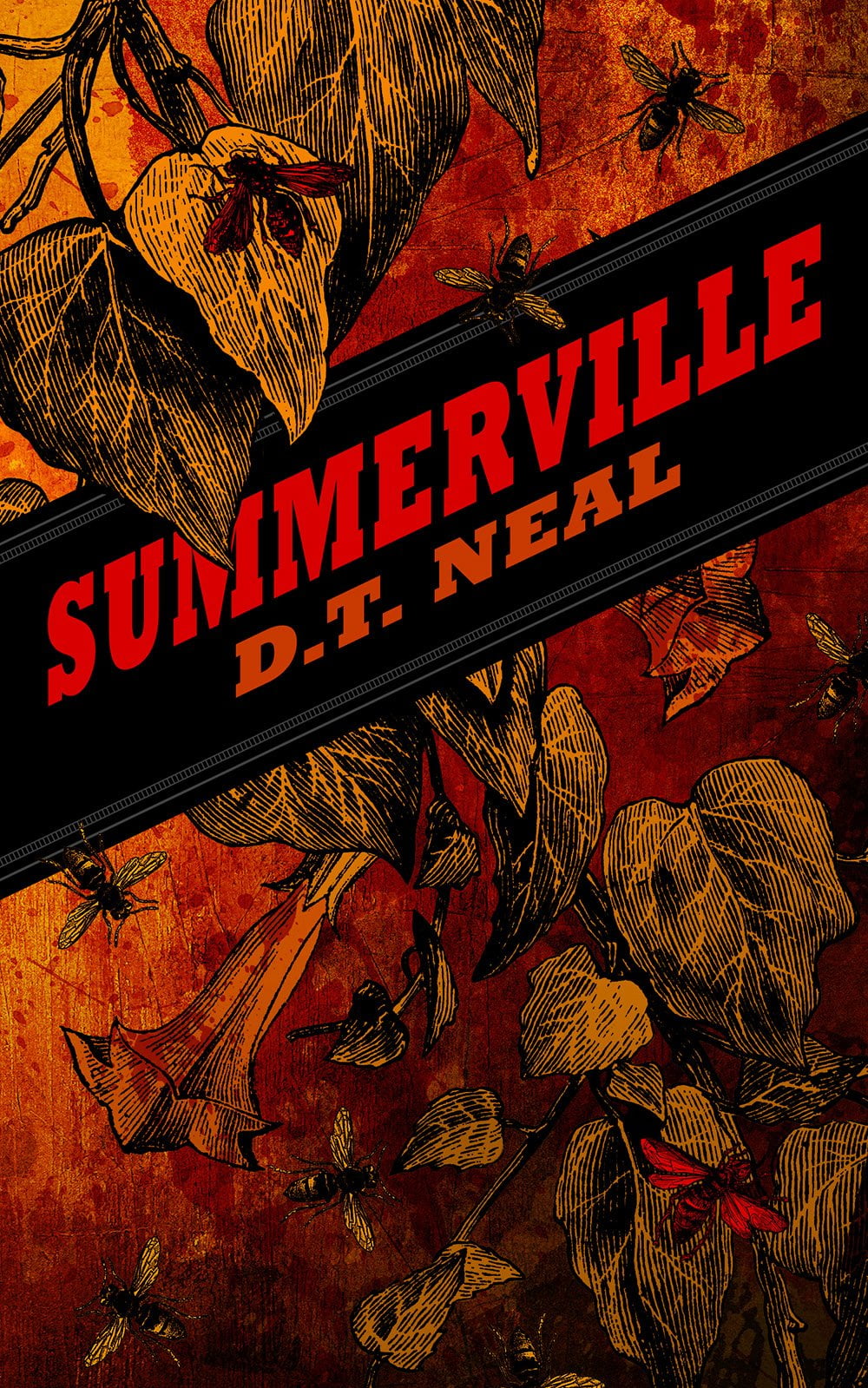D.T. NEAL
SUMMERVILLE

ECO-HORROR | NOVELLA
Three friends set out to find casks of 150-year-old brandy at the bottom of a South Carolina river, not knowing that they’ve walked right into the clutches of a growing evil in the ghost town of Summerville.
“…the perfect horror novella. It has witty banter, horror, and human v. nature.”
—Tasha, Goodreads review
ABOUT D.T. NEAL
Born in Missouri, growing up in Ohio, and settling in Chicago, D. T. Neal has always written fiction, but only got really serious about it in the late 90s. He brings a strong Rust Belt perspective to his writing, a kind of “Northern Gothic” aesthetic reflective of his background.
Writing his first novel at 29, he then devoted time to his craft and worked on short stories, occupying a space between genre and literary fiction, with an emphasis on horror, science fiction, and fantasy. He has seen some of his short stories published in “Albedo 1,” Ireland’s premier magazine of speculative fiction, and he won second place in their Aeon Award in 2008 for his short story, “Aegis.” He has lived in Chicago since 1993, and is a passionate fan of music, a student of pop culture, an avid photographer and bicycler, and enjoys cooking.
He has published six novels, Saamaanthaa, The Happening, and Norm—collectively known as The Wolfshadow Trilogy—Chosen, Suckage, the cosmic folk horror-comedy thriller, The Cursed Earth. He has also published three novellas—Relict, Summerville, and The Day of the Nightfish.
He co-edited THE FIENDS IN THE FURROWS folk horror anthologies, The Fiends in the Furrows: An Anthology of Folk Horror, The Fiends in the Furrows II: More Tales of Folk Horror, and The Fiends in the Furrows III: Final Harvest.
AWARDS:
• 2008 Aeon Award, Second Place for “Aegis”
• 2009 Honorable Mention, “Best Horror of the Year,” edited by Ellen Datlow for “Aegis” and “Rotgut.”
• Runner-up, 2013 Best New Novel by a Chicagoan, Chicago Reader, for “Suckage”
• Shortlisted for the 2012 Aeon Award for “Day of the
PRODUCT DETAILS
- Paperback: 112 pages (Novella)
- Language: English
- ISBN-13: 978-1491271568
EXCERPTS
“SUMMERVILLE slept and Summerville woke, gowned insanely in emerald, jade, and malachite—velvety, slouching splendor, wrapped tight and held fast, waiting, waiting, waiting. The time was right, its seeds were ripe. Not a bird sang, not a cricket chirped, just the leaves, shaped like spades or hearts, like a
Those leaves softly whispered in the wind that carried off the fog in the drowsy morning sunlight, where the heat hung heavy and the Black River flowed languidly, without the taste of snow at its source to feed its fury.
It was a fat river, now, and a lazy one, as well. Long past the time when the river had claimed half the town in a grand flood, had cut the place off from the land around it, had turned it into a drowned island, an antebellum Atlantis.
The rest of the town, what had remained of it was three streets: Main Street, First Street, and Temple Street. All that was left: one, two, three. And even that had been too much, for there was nothing left but empty, now, and fields of green and tangled vines, always the vines, and a half-burned broken bridge that hung in space, an accusatory, mossy finger.
Only the wasps kept Summerville company, buzzing back and forth from their great hive, which had grown mammoth over the years. When winters came, the wasps would die. But winter stopped coming to Summerville, hadn’t been there for years, and the hive had grown ever-larger, like a tumor.
Dreadful things had come to Summerville, and the town had paid for it, the accounts had long been settled. But the place remained, though it showed up on no maps, and river-riders would marvel at the broken bridge and the thick vines that formed cyclopean shapes above them on the banks of the Black River, beckoning, tempting, sweetly-scented. But there were few portages, no proper ports of call, and most would snap a picture or two, always the bridge, the half-burned spar, what locals used to call The Jut, back when there were still locals to be found.
Once in a while, a visitor would find a spot to rest their feet amid the lumbering vines, would tie down and call to their friends to join them. They would laugh and break the vow of silence that had ruled Summerville for decades, so long that the place itself hardly remembered how long it had been since people had last walked its streets.
But always, they would be daunted by the tangled vines, which grew in such abundance that they choked all other plants that had tried to live in the damned place. White trees, standing skeletons, all dead, now, starved for light while draped in the green of the vine, throttled by thick brown stands of
They stopped and photographed themselves there, smiling by the rusting sign, discussing why the sign was yellow and black when it should have been red and white, entertaining theories, all of them wrong, for Summerville had died in 1954, and the sign remained because it had not been changed, the place had been forgotten, and everyone was dead, there.
Having been warned without realizing it, the visitors would press on, laughingly. And down Main Street they would go, stepping gingerly between the tangled vines, never to return.”
© D.T. Neal

